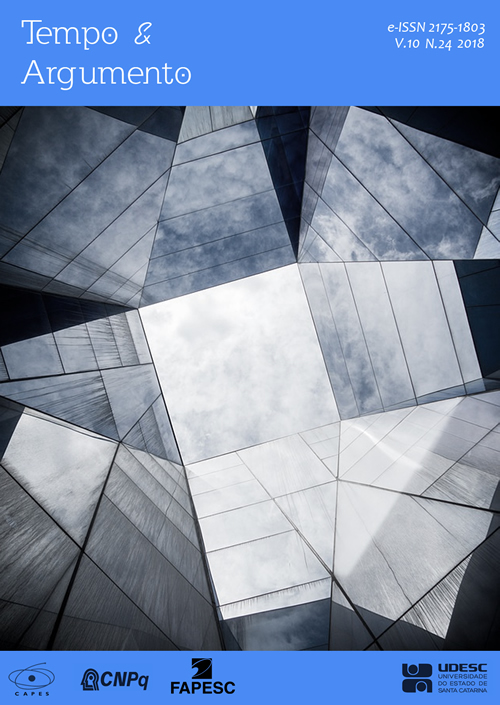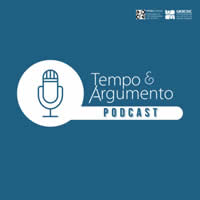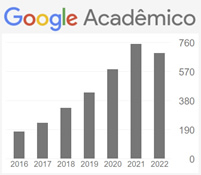As teses narrativistas na linhagem anglo-americana da teoria da história
DOI :
https://doi.org/10.5965/2175180310242018064Résumé
Com vistas a contribuir para uma maior familiaridade com a linhagem anglófona da teoria da história, este artigo oferece uma exegese do exame narrativista realizado no pensamento historiográfico anglo-americano a partir de meados do século XX, por meio de obras que apresentaram alguns dos questionamentos seminais da filosofia analítica relacionados ao significado dos enunciados e aos esquemas conceituais e lógicos da história. Não se trata, contudo, de propor uma arqueologia da filosofia analítica da história nem de tentar percorrer o itinerário do debate sobre a filosofia da linguagem desde o Tractatus Logico-Philosophicus de Wittgenstein. Busca-se, mais precisamente, oferecer uma apresentação breve de alguns debates teóricos que antecederam o que se convencionou denominar linguistic turn, enumerando as linhas gerais de seus autores e argumentos determinantes, com o objetivo de ajudar a tornar a tradição anglófona do pensamento teórico acerca da história mais familiarizada no Brasil. Para isso, descreve-se o contexto e a distinção da teoria da história de linhagem anglófona e da teoria da história da linhagem francófona, para, em seguida, explicar como a crítica à tese de Carl Gustav Hempel ajudou a promover reflexões que redundaram nas teses narrativistas que precederam as obras de Louis Mink e de Hayden White. Demonstra-se, assim, a existência de um interesse progressivo de filósofos analíticos pela teoria da história e, como resultado da consolidação de tal interesse, o estabelecimento de um contexto propício ao florescimento das teses narrativistas.
Palavras-chave: Teoria da História. Filosofia Analítica. Narrativismo. Virada Linguística.
Téléchargements
Références
AGUIAR, Túlio Roberto Xavier de. As simetrias do modelo hempeliano de explicação. Kriterion: Revista de Filosofia, Belo Horizonte, v. 46, n. 111, p. 138-152, 2005.
BERLIN, Isaiah. History and theory: the concept of scientific history. History and Theory, Middletown, v. 1, n. 1, p. 1-31, 1960.
BRAUDEL, Fernand. História e ciências sociais. A longa duração. In: BRAUDEL, Fernand. Escritos sobre a história. 2. ed. São Paulo: Perspectiva, 2005.
CHERNISS, Joshua; HARDY, Henry. “Isaiah Berlin”. In: ZALTA, Edward N. (Ed.). The Stanford encyclopedia of philosophy. Palo Alto: Stanford University Press, 2012. [s.p].
DANTO, Arthur C. On historical questioning. The Journal of Philosophy, New York, v. 51, n. 3, p. 89-99, 1954.
DANTO, Arthur C. Laws and explanation in history, by William Dray. Ethics, Washington, v. 68, n. 4, p. 297-299, 1958.
DANTO, Arthur C. Narrative sentences. History and Theory, Middletown, v. 2, n. 2, p. 146-179, 1962.
DANTO, Arthur C. Analytical philosophy of history. Cambridge: Cambridge University Press, 1965.
DANTO, Arthur C. The problem of other periods. The Journal of Philosophy, New York, v. 63, n. 19, p. 566-577, 1966.
DANTO, Arthur C. Historical language and historical reality. The Review of Metaphysics, Washington, v. 27, n. 2, p. 219-259, 1973.
DANTO, Arthur C. Narration and knowledge. Philosophy and Literature, Baltimore, v. 6, n. 1/2, p. 17-32, 1982.
DANTO, Arthur C. Narration and knowledge: including the integral text of Analytical Philosophy of History. New York: Columbia University Press, 1985.
DERFER, George E. Philosophy and the historical understanding (review). Journal of the History of Philosophy, Baltimore, v. 4, n. 2, p. 161-164, 1966.
DONAGAN, Alan. Analytical philosophy of history, by Arthur C. Danto. History and Theory, Middletown, v. 6, n. 3, p. 430-435, 1967.
DRAY, William H. Laws and explanation in history. London: Oxford University Press, 1957.
DRAY, William H. (Ed.). Philosophical analysis and history. New York: Harper & Row, 1966. (Sources in Contemporary Philosophy).
DRAY, William H. On the nature and role of narrative in historiography. History and Theory, Middletown, v. 10, n. 2, p. 153-171, 1971.
FETZER, James. “Carl Hempel”. In: ZALTA, Edward N. (Ed.). The Stanford encyclopedia of philosophy. Palo Alto: Stanford University Press, 2012. [s.p].
GALE, Richard M. Analytical philosophy of history, by Arthur C. Danto. Foundations of Language, [s.l], v. 4, n. 2, p. 188-191, 1968.
GALLIE, Walter Bryce. An interpretation of causal laws. Mind, Oxford, v. 48, n. 192, p. 409-426, 1939.
GALLIE, Walter Bryce. The limitations of analytical philosophy. Analysis, Oxford, v. 9, n. 3, p. 35-43, 1949.
GALLIE, Walter Bryce. What makes a subject scientific? The British Journal for the Philosophy of Science, Oxford, v. 8, n. 30, p. 118-139, 1957.
GALLIE, Walter Bryce. The historical understanding. History and Theory, Middletown, v. 3, n. 2, p. 149-202, 1963.
GALLIE, Walter Bryce. Philosophy and the historical understanding. New York: Schocken Books, 1964.
HEMPEL, Carl Gustav. The function of general laws in history. The Journal of Philosophy, New York, v. 39, n. 2, p. 35-48, 1942.
HEMPEL, Carl Gustav. Explanation in science and in history. In: DRAY, William H. (Ed.). Philosophical analysis and history. New York: Harper & Row, 1966. p. 95-126. (Sources in Contemporary Philosophy).
LEACH, James. Dray on rational explanation. Philosophy of Science, Seattle, v. 33, n. 1/2, p. 61-69, 1966.
LÉVI-STRAUSS, Claude. História e etnologia. In: LÉVI-STRAUSS, Claude. Antropologia estrutural. 6. ed. Rio de Janeiro: Tempo Brasileiro, 2003
LIMA, Luiz Costa. A aguarrás do tempo: estudos sobre a narrativa. Rio de Janeiro: Rocco, 1989.
LITTLE, Daniel, “Philosophy of History”. In: ZALTA, Edward N. (Ed.). The Stanford encyclopedia of philosophy. Palo Alto: Stanford University Press, 2012. [s.p].
MALERBA, Jurandir (Org.). História e narrativa: a ciência e a arte da escrita histórica. Petrópolis, RJ: Vozes, 2016.
MINK, Louis O. The autonomy of historical understanding. History and Theory, Middletown, v. 5, n. 1, p. 24-47, 1966.
MINK, Louis O. Change and causality in the history of ideas. Eighteenth-Century Studies, [s.l], v. 2, n. 1, p. 7-25, 1968a. Special issue.
MINK, Louis O. Philosophical analysis and historical understanding. The Review of Metaphysics, Washington, v. 21, n. 4, p. 667-698, 1968b.
MINK, Louis O. History and fiction as modes of comprehension. New Literary History, Baltimore, v. 1, n. 3, p. 541-558, 1970.
TELLES, Marcus Vinícius de Moura. Simultaneidade e retrospecção: o debate sobre a narrativa na filosofia da história anglo-saxônica (1942-1973). 2013. 196 f. Dissertação (Mestrado em História Social) – Universidade Federal do Rio de Janeiro, Rio de Janeiro, 2013.
WEINGARTNER, Rudolph H. Danto on history. Philosophy and Phenomenological Research, Medford, v. 28, n. 1, p. 100-113, 1967.
WHITE, Hayden. The burden of history. History and Theory, Middletown, v. 5, n. 2, p. 111-134, 1966.
WHITE, Hayden. Interpretation in history. New Literary History, Baltimore, v. 4, n. 2, p. 281-314, 1973.
WHITE, Hayden. Metahistory: the historical imagination in nineteenth-century Europe. Baltimore, MD: Johns Hopkins University Press, 1975.
WHITE, Hayden. The value of narrativity in the representation of reality. Critical Inquiry, Chicago, v. 7, n. 1, p. 5-27, 1980.
WHITE, Hayden. The narrativization of real events. Critical Inquiry, Chicago, v. 7, n. 4, p. 793-798, 1981.
WHITE, Hayden. The question of narrative in contemporary historical theory. History and Theory, Middletown, v. 23, n. 1, p. 1-33, 1984.
WHITE, Hayden. Historical pluralism. Critical Inquiry, Chicago, v. 12, n. 3, p. 480-493, 1986.
WHITE, Morton Gabriel. A note on the method of history. The Journal of Philosophy, New York, v. 40, n. 12, p. 317-319, 1943a.
WHITE, Morton Gabriel. Historical explanation. Mind, Oxford, v. 52, n. 207, p. 212-229, 1943b.
WHITE, Morton Gabriel. The attack on the historical method. The Journal of Philosophy, New York, v. 42, n. 12, p. 314-331, 1945.
WHITE, Morton Gabriel. Foundations of historical knowledge. New York: Harper & Row, 1965.





